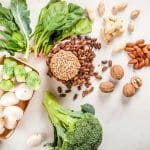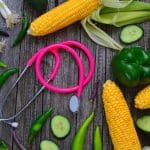Iron deficiency is often cited as a concern for individuals following a vegan diet. However, with careful planning and attention to diet, it is entirely possible for vegans to meet their iron requirements without relying on animal products. In this post, we will debunk the myth surrounding iron deficiency in veganism and provide valuable insights into iron-rich plant-based foods, symptoms of iron deficiency, factors affecting iron absorption, tips for enhancing iron absorption in vegan meals, supplements for iron deficiency, and the importance of regular iron monitoring in a vegan diet. By the end of this post, you’ll have a better understanding of how to ensure adequate iron intake while following a vegan lifestyle.
Iron-Rich Plant-Based Foods for Vegans
When it comes to meeting your iron needs on a vegan diet, incorporating a variety of plant-based foods rich in this essential mineral is key. Here are some iron-rich options to include in your meals:

- Lentils: A versatile legume that can be used in soups, stews, salads, and more.
- Tofu: A great source of iron, especially if it’s made with iron-fortified soybeans.
- Spinach: Packed with iron and can be added to smoothies, stir-fries, or enjoyed in salads.
- Quinoa: A nutritious grain that is not only high in iron but also a complete protein.
- Pumpkin Seeds: These seeds are a good snack option and can also be sprinkled on salads or oatmeal.
Additionally, pairing these iron-rich foods with vitamin C sources like citrus fruits, bell peppers, and tomatoes can help enhance iron absorption. Don’t forget to explore iron-fortified foods such as breakfast cereals, plant-based milk, and nutritional yeast to ensure you’re getting enough iron in your diet.
Experimenting with cooking methods like using cast-iron cookware and including dried fruits like apricots, raisins, and prunes as snacks can also help boost your daily iron intake. By being mindful of your food choices and incorporating a variety of iron-rich plant-based options, you can easily meet your iron needs as a vegan.
Symptoms and Consequences of Iron Deficiency
Iron deficiency can have various symptoms and consequences that should not be overlooked. Here are some common signs to watch for:
- Fatigue: Feeling unusually tired or weak, even after getting enough rest.
- Weakness: Muscle weakness and lack of stamina in daily activities.
- Pale skin: A paler complexion than usual, often noticeable in areas like the face and fingernails.
- Brittle nails: Nails that break easily and show signs of ridges or discoloration.
If left untreated, iron deficiency can lead to more severe consequences, including:
- Anemia: A condition where the blood lacks enough healthy red blood cells to carry oxygen efficiently.
- Impaired cognitive function: Reduced mental clarity, concentration, and memory.
- Compromised immune system: Increased susceptibility to infections and illnesses.
- Hair loss: Thinning or loss of hair due to inadequate iron levels.
- Dizziness: Feeling lightheaded or dizzy, especially when standing up quickly.
- Shortness of breath: Difficulty breathing or catching your breath with minimal exertion.
- Irregular heartbeat: Heart palpitations, rapid heart rate, or an irregular heartbeat rhythm.
It is important to recognize these symptoms and consequences of iron deficiency and seek appropriate medical attention for diagnosis and treatment.

Factors Affecting Iron Absorption in Vegan Diet
Plant-based iron sources are less readily absorbed compared to animal-based sources due to differences in iron form.
Tannins in tea and coffee, calcium in dairy alternatives, and phytates in whole grains can inhibit iron absorption.
Cooking methods like soaking, sprouting, and fermenting can help reduce antinutrients that hinder iron absorption.
Iron absorption can be enhanced by consuming iron-rich foods separately from those high in inhibitors.
Limiting consumption of foods high in inhibitors and optimizing meal combinations can improve overall iron absorption.
Tips for Enhancing Iron Absorption in Vegan Meals
– Combine iron-rich plant foods with vitamin C sources like citrus fruits, berries, and broccoli for better absorption.
– Avoid antinutrient-rich beverages during meals and instead opt for water or vitamin C-rich drinks.
– Incorporate fermented foods like kimchi, sauerkraut, and miso to support gut health for improved iron absorption.
– Consider adding spices like turmeric, ginger, and cinnamon to dishes as they can promote iron bioavailability.
– Plan meals with a variety of iron sources, plant proteins, and vitamin C-rich foods to optimize overall iron absorption.
Supplements for Iron Deficiency in Vegans
Consult a healthcare provider before starting iron supplements to determine the appropriate dosage.
Iron supplements can help vegans meet their iron needs, especially if dietary intake is insufficient.
Common iron supplements include ferrous sulfate, ferrous gluconate, and iron amino acid chelate.
Consider time-released iron supplements to minimize potential side effects like constipation.
Regularly monitor iron levels through blood tests when taking supplements to avoid iron overload.
Importance of Regular Iron Monitoring in Vegan Diet
Regular blood tests can help vegans track their iron status and make adjustments to their dietary intake.
- Monitor other essential nutrients like vitamin B12, zinc, and folate alongside iron levels for overall health maintenance.
- Maintaining optimal iron levels can prevent the development of iron deficiency anemia and related complications.
- Consult a registered dietitian or healthcare provider for personalized iron monitoring and dietary recommendations.
- Adopting a balanced and varied vegan diet can support adequate iron intake and reduce the risk of deficiency over time.















































